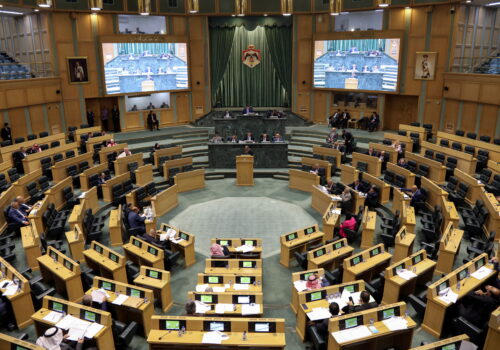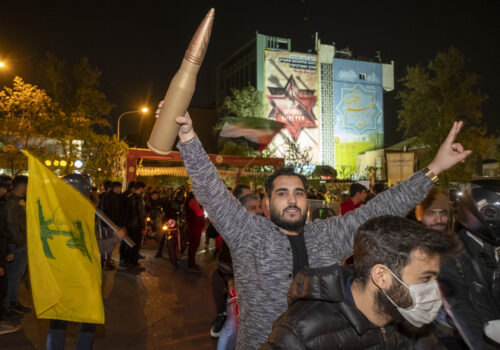With Trump back, King Abdullah is thinking about ‘Jordan First’
More than a decade before Donald Trump descended upon the golden escalator to announce his first presidential campaign, King Abdullah launched an initiative called “Jordan First,” or al-Urdun Awalan in Arabic. Billboards nationwide were plastered with the new slogan in an attempt to strengthen Jordanian nationalism. Citizens across the Hashemite Kingdom were outraged over the looming 2003 US invasion of Iraq and the high Palestinian death toll during the Second Intifada. Despite calls to expel US troops from the kingdom and annul the 1994 peace deal with Israel, Abdullah avoided such steps, insisting that Jordan needed to prioritize its national interests above pan-Arab concerns and not jeopardize ties with Washington.
Ahead of President-elect Donald Trump’s second term, the Hashemite king is again looking to adopt a “Jordan First” policy despite domestic outrage over US support for Israel’s war in Gaza. Hours after Trump’s electoral victory, Abdullah offered his “warmest” congratulations to the Republican leader and pledged to strengthen the US-Jordanian alliance. Even before the polls closed on November 5, the Hashemite ruler worked to maintain ties with the Trump family. After the July 13 assassination attempt against Trump, Abdullah condemned the shooting attack in Pennsylvania. Last year, the royal family invited Ivanka Trump and her husband, Jared Kushner, to Crown Prince Hussein’s wedding in Amman.
SIGN UP FOR THIS WEEK IN THE MIDEAST NEWSLETTER
Despite these government efforts, many in Amman are worried about Trump’s return to the White House as about half of Jordan’s population is of Palestinian descent. During his last presidential term, Trump relocated the US embassy from Tel Aviv to Jerusalem and cut US aid to the United Nations Relief and Works Agency for Palestine Refugees in the Near East (UNRWA), both moves that the Hashemite Kingdom critiqued. Former Jordanian Foreign Minister Marwan Muasher argued that Trump’s hawkish nominations for US ambassador to Israel and national security advisor signal that Washington might not oppose Israel’s annexation of the West Bank, a long-standing fear of the Hashemite Kingdom. Abdullah has repeatedly rejected the creation of an alternative homeland for Palestinians in Jordan, a greater possibility should the Jewish state annex the West Bank. Muasher voiced alarm about the mass displacement of Palestinians from the West Bank into Jordan during the next administration. However, there is no evidence to show Trump’s support for such a significant change. (It’s worth noting that Trump refused to greenlight Prime Minister Benjamin Netanyahu’s 2020 plans to annex the West Bank, thwarting the initiative.)
Jordanian Senator Amer Hadidi also expressed concern that Trump viewed Amman in his first term as a less critical regional voice than those of the Arab Gulf states. While Saudi Arabia offered Trump multibillion-dollar arms agreements, Hadidi noted that, as a poorer country, Jordan could not provide the Republican leader with such economic victories.
Nonetheless, some Jordanians are less pessimistic about the bilateral relationship during the next administration. Jordanian government spokesman Mohammad al-Momani said, “Jordanian-American relations are strategic and institutionalized, regardless of the ruling party in the United States.” During his quarter century in power, Abdullah has worked tirelessly to boost cooperation with both Republican and Democratic members of Congress in frequent briefings with lawmakers. The countries’ security ties have remained strong as Jordan hosts thousands of US troops in the kingdom. In coordination with Washington, Amman also shot down dozens of Iranian drones and missiles fired at Israel in April and again in October despite domestic criticism. Such moves demonstrate that the Hashemite Kingdom is not freeloading off its US ties—a key Trump priority.
Former Jordanian Minister Mohammad Abu-Rumman explained that US aid to Jordan increased to then record levels under Trump, reaching $1.3 billion annually. Amid the Hashemite Kingdom’s ongoing fiscal woes, the Trump administration proved a reliable partner for Amman despite calls by some Americans to reduce foreign-assistance packages. Abdullah was also the first Arab leader to meet Trump as president in 2017, a practice repeated under President Joe Biden. Despite disagreeing at times about the Palestinian question, Abdullah ensured that Jordan’s bilateral relationship with the United States stayed on track during Trump’s first term, and billions of dollars of aid continued to flow.
In recent weeks, Jordan has worked to boost relations with Saudi Arabia and the United Arab Emirates to ensure Amman’s interests are not harmed, even if Trump becomes closer to the Gulf states. On November 20, Abdullah visited Abu Dhabi for a meeting with President Mohammed bin Zayed and commended the “strong” ties between Jordan and the United Arab Emirates. A month earlier, Abdullah met Saudi Crown Prince Mohammed bin Salman to coordinate positions on the Gaza and Lebanon wars.
Finally, Abdullah even benefitted at times from Trump’s unorthodox decision-making. In 2017, Foreign Policy reported that Trump “dumped” US Ambassador to Amman Alice Wells after the Jordanian leader developed a grudge against the career foreign service officer. Abdullah had previously asked the Barack Obama administration to switch envoys, but the Democratic president declined to fire Wells, who won more than a dozen State Department awards during her tenure. Under a Trump presidency, the Hashemite Kingdom has little need to worry about US criticism on human rights issues, even as Freedom House recently downgraded Jordan to its lowest ranking of “not free.”
Although Amman will face challenges during Trump’s second term, Abdullah will likely continue prioritizing strong relations with the United States over all other foreign policy concerns. It’s been a remarkably consistent element of Abdullah’s twenty-five-year tenure as monarch and one of the reasons he has stayed in power for so long.
Aaron Magid is the host of the podcast On Jordan. A former Amman-based journalist, his articles on the Hashemite Kingdom have appeared in Foreign Affairs, Foreign Policy, and al-Monitor. Follow him on X: @AaronMagid.
Further reading
Sat, Sep 7, 2024
Will Jordan’s new electoral law bring real change?
MENASource By
The resulting changes are likely only cosmetic since Jordanian parties are not winning voters’ confidence for various reasons.
Wed, Apr 3, 2024
Jordan was already walking a tightrope. Then the Gaza war happened.
MENASource By
Around six months into the war, many Jordanians have not been satisfied with their government’s response to the Gaza war.
Thu, Apr 18, 2024
Jordan took out Iranian munitions over its airspace. Now it has tensions with its people and Iran.
MENASource By
A full-scale Iran-Israel war would likely harm the Hashemite Kingdom, which is squeezed between the two more powerful adversaries.
Image: A Palestinian refugee family watches a televised broadcast of U.S. President Donald Trump delivering an address where he is expected to announce that the United States recognises Jerusalem as the capital of Israel, at Al-Baqaa Palestinian refugee camp, near Amman, Jordan December 6, 2017. REUTERS/Muhammad Hamed


